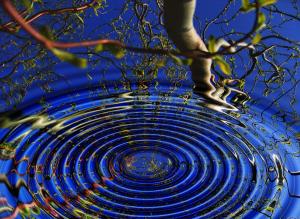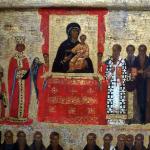
Beauty, it is said, is in the eye of the beholder. One person will see beauty in what another person considers ugly. This is possible because everything which exists has its own beauty, a beauty which it has by nature, a beauty which some people are better able to ascertain it than others. God, of course, discerns that beauty, because, as St. Gregory of Nyssa explained, God knows all things in relation to their nature and the beauty or glory of that nature:
But the eye of God does not have regard to creatures’ blooming beauty, nor does it define beauty and goodness in terms of a fine color or a fine shape, but rather in terms of how each thing, in its being, has in itself a complete and perfect nature. [1]
Such beauty can become marred and more difficult to discern, making it far more difficult for us to discern. Even then, some of us will able to see beyond all the defilement which overlies the beauty, allowing us to see the beauty which lies underneath the defilement which makes things appear ugly.
Nothing is absolutely ugly. Evil does not exist in and of itself but rather thrives on some good; there is always some good in anything which exists despite how corrupted it might be by evil. Similarly, falsehood is some misapprehension and distortion of the truth, cutting off some portion of the truth from its holistic unity with the rest of what is true, perverting it, making that fragment of the truth appear to contain more of the truth than it actually does. And so ugliness, like evil and falsehood, distorts the transcendental which it corrupts. Ugliness relies upon the beauty it undermines to try to establish itself in the world: the harmony which holds the beauty of a thing together is lost, and so what remains comes together in an imperfect unity
Beauty, goodness, and truth, all of which are linked together and ontologically one, all continue to exist, in some form or another, in their so-called opposites (because such opposites really are not opposites of those transcendentals, but their privations). This allows those who are discerning to find the elements of beauty, goodness, and truth which remain in what is otherwise said to be ugly, evil, or false. This is why it is possible for someone to find something to be both beautiful and ugly at the same time, for they see the beauty of the elements but also discern the discord in the way they come together..
Those who look for beauty in the world can and will find it everywhere; they might have to look long and hard to find it, but they can find it, and then they do, they will find it in every object, as everything which exists always has its own particular beauty. Florensky rightfully points out that once we discern such beauty, we are only at the beginning of our interaction with it. We should allow the glory and enchantment found in such beauty enter our soul, for that will allow it to share with us all the radiance which it has been given:
Beauty is not such a thing that you can penetrate it at once. Or, to be more exact, you may penetrate it all at once, but after you have stood with her and let a gradual process happen in your soul, organically absorbing its elements. [2]
Beauty will save the world the same way truth and goodness will save the world. By itself, cut off from the other transcendentals, beauty is no longer beauty, just as goodness is no longer properly good when it is discerned apart from truth or beauty, or some claim of truth is no longer true if it is cut off from the goodness and beauty which flows from the truth. Beauty will save the world, but it must be an integrated beauty, one which brings with it the goodness and truth of being itself. Beauty without its inner connection to the good and truth is but a hollow beauty. Beauty needs the fullness of being to be all it can be; when it has such being, then beauty shall truly point the way of salvation, for it will show us the way of integration. We will let the one sharing its beauty merge with us so that we will experience the glory contained in that beauty even as we will share ourselves and our beauty and glory with the one which shares its beauty with us, allowing it to experience what we possess. Through beauty, through the glory and radiance of beauty, things can and will come together and form one integral whole, revealing the interdependent unity which lies behind creation. By such interdependence, the whole of creation will be able to receive the beauty and glory of God and all that such glory brings with it. This is why it is not wrong to start with and explore the beauty of being in the world for that beauty participate in and comes from the greater beauty which is in God: we are given a pointer to the greater beauty of God through created beauty. Thus, as St. Isidore of Seville declared, through the limited beauty of created being we are turned towards the greater and absolute beauty of God:
From the beauty of the limited creature, God makes known his own beauty that is in no way limited, so that the human being can return to God by these very same vestiges by which he turned away from him, in order that, because he turned himself away from the form of the Creator through love of the beautiful creature, he might return back again through the beauty of the creature to the beauty of the Creator.[3]
Beauty is important. When we let it pierce our soul, we find it gives us energy, motivation, and inspiration. This is true for both created beauty as well as the uncreated, transcendent beauty of God. Beauty inspires love, and love seeks for unity with the beloved. Beauty, in this way, draws us out of our isolation, the isolation which leads us to experience our own private, self-made hell, so that we can truly begin to make our way to our proper unity with all being and experience the glory found in that unity. This is what so many experience in meditation; though they might seem to be isolating themselves, in reality, they are drawing themselves out and finding ways to experience unity with the rest of creation. This is an important step in our spiritual development. We must be able to transcend ourselves through love, joining ourselves with others by such love. The more we do so, the more we will discern that there is a source and foundation for all such beauty, God, because God’s actions (energies) establish such beauty (allowing us to explain why God can be said to be absolutely beautiful ). Because of this, the more we reach out and unite ourselves to the beauty contained in created being, we shall find ourselves reaching out with love to God and uniting ourselves to God, not, of course, in an individualistic manner which isolates ourselves from the rest of created being, but rather, in a way which allows us to continue to experience our unity with the rest of created being. Thus, unity with God does not do away with the goodness God gave to created being, nor the goodness which is to be had when created being coming together as one Rather, such unity affirms it. Salvation is not individualistic, it is personal, and therefore, communal. Theosis, likewise, is not individualistic but communal as well. And so there is no nihilistic absorption of all things in God, but rather the radical self-giving of God to all things so that all things can be one with each other and with God, a unity which we find ourselves drawn into through beauty and realized through love.
[1] St. Gregory of Nyssa, On the Six Days of Creation. Trans. Robin Orton (Washington, DC: CUA Press, 2021), 80.
[2] Pavel Florensky, Letters from the Gulag. Trans. Adela Lawless (No City: Independently Published, 2020), 48 [To Olcheka, Jan 17, 1934].
[3] St. Isidore of Seville, Sententiae. Trans. Thomas L. Knoebel (New York: Newman Press, 2018),40.
Stay in touch! Like A Little Bit of Nothing on Facebook.
If you liked what you read, please consider sharing it with your friends and family!











